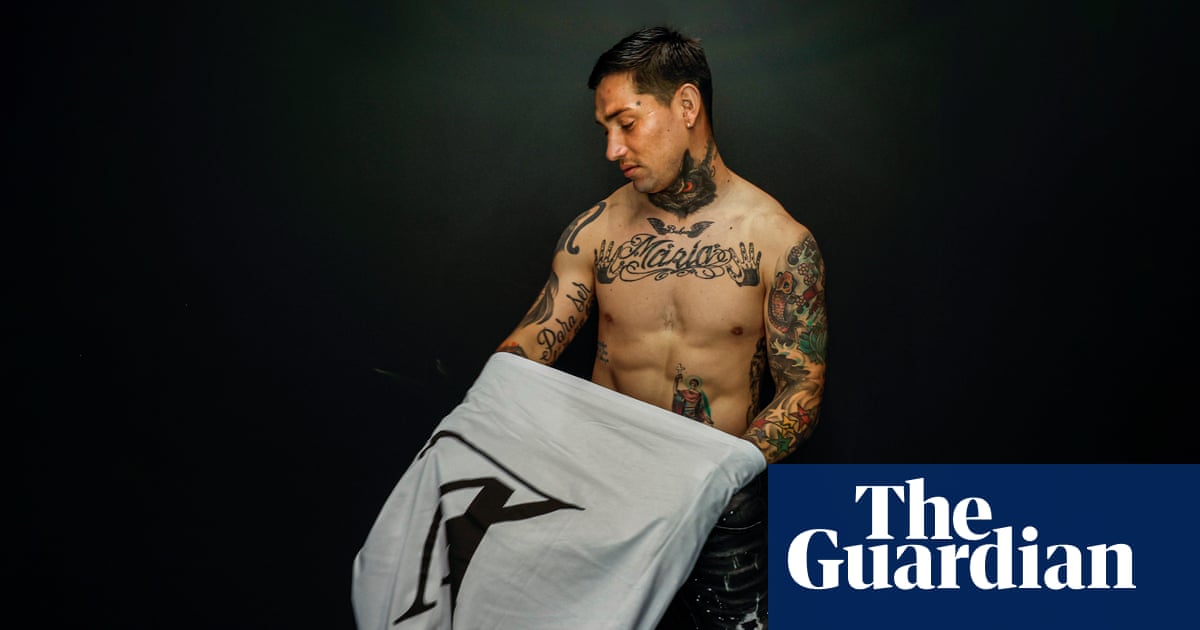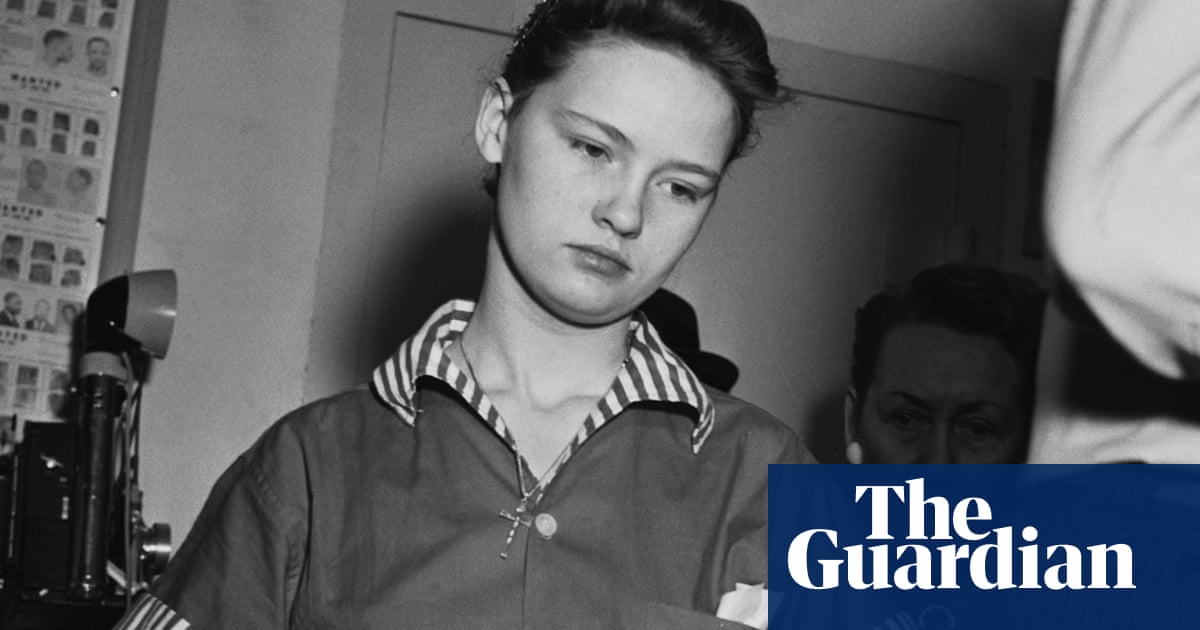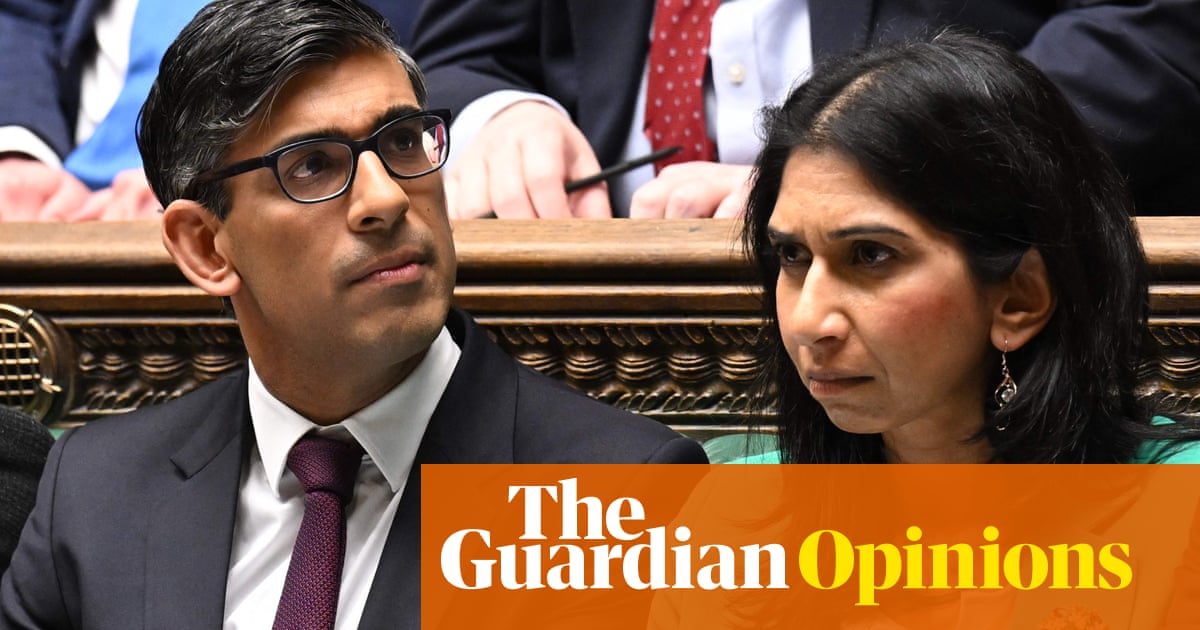
“Iwouldn’t call it pressure now: I love it.” Chimy Ávila, the Osasuna striker and human wrecking ball whose astonishing story is written all over his body and who tells it brilliantly too, unfiltered and funny despite the sacrifice and suffering, pictures himself on the penalty spot. He sees himself in Seville at the Copa del Rey final against Real Madrid, with one shot to deliver his club’s first ever trophy. And, inevitably, he sees Empalme Graneros in Argentina, where he took so many, already playing for a living long before becoming pro. “It’s harder in the hood,” he says. On Saturday night Thibaut Courtois won’t be carrying a gun, for a start.
One of nine children, Ávila grew up in north-east Rosario in a neighbourhood where, he says, you never knew when the bullets would fly, gangs fought and he, too, went armed. His home had a tin roof that leaked when it rained and flew when it was windy, but also had a pitch just outside the door. “I would do anything for my daughter to go and play barefooted where I did, to come back with a muddy face, walk those dirty streets,” he says, and yet if there’s fondness there was a fear that forged him, too. You want pressure? Out there, where clandestine games were staged, scoring was survival.
“This is different,” Ávila says. “This is a challenge, a nice one against the world’s best goalkeeper. Back then it could be against a goalkeeper with a gun around his neck.
“All these big clubs have academies; mine was Empalme. I look back even just seven or eight years and I didn’t expect to be here, playing this final. I expected to be taking a penalty at four o’clock in the morning so my family could eat. You would go out at night and there would be games for money. One on ones, penalties, bets placed. ‘Play: 100.’ People turn up: ‘200 on the goalie’, ‘300 on the taker’. I tell kids now to enjoy playing as a game; once there’s money, it’s different.
“Professional footballers are a kind of commodity, belonging to someone else and in the barrio it’s similar. You’re shooting for your ‘silver’ and this guy’s ‘silver’, too, for other people, heavy people. A gang leader would come and say: ‘Take penalties for me.’ You’re not going to say no. If you win, you know they’ll give you money and I have siblings who need feeding. You put the ball down: a small goal, people in the way. The goalkeeper’s looking at you: ‘You want some?’ And you think: ‘If I score, I’m going to eat all week. And if I miss …’”
There is a moment when Ávila talks about the friends that were killed or ended up in jail, temptations that were not always resisted, discussing prisons and the way they affect people’s lives. There’s a nostalgia for the way Empalme was, an insistence that the poverty and crime are worse now but that it was bad enough when he was there, a place where it was “easier to pick up a gun than a ball”. He’s taken some serious hits but he made it; perhaps that was why.
There’s no pity, instead riotous, warm company. Booming with laughter, Ávila talks a bit like he plays: crashing about, direct, never flinching, carrying you along. Hence he cracks up when he reveals his idols to be Juan Román Riquleme and Toni Kroos – players that “don’t fit me at all”. He says, one day, he would like to tell his small daughters everything, but it’s not shame that stops him. “I have never been ashamed of who I am.” Which is not the same as having no regrets and he tells his story raw, the honesty startling.
Ávila reveals how his character was made: a strength, a determination built in poverty. He can’t stand food being wasted or taps left on. If he hears the cistern going he’s there lifting the lid, tinkering. His father had problems with addictions; he eventually worked out that his mother’s “stomach aches” were just an excuse to give what little food there was to her children. Ávila had his first tattoo at 10, homemade with a biro and a needle. He married Maria at 15. She, like Ávila’s mum, would drag him off the streets.
“Football pulled me out,” Ávila says. The alternative was “bars or a box”. He talks about “destiny” now but one day he told Maria it was never going to happen. When he was at Tiro Federal he was accused – wrongly – of stealing kit and balls, booted out the club along with his brother and his mum, a cleaner there. He went two years without kicking a ball but insists: “God gives us all a gift. You don’t forget what you love, what you were born to do.”
Ávila did plenty. “I pushed a trolley round, scavenging cardboard and scrap metal, worked as a bricklayer, a painter, I cut hair, I did anything.” At least it was honest, he was not hurting anyone, which he had done. There were rules: a code, he calls it, one whose loss he laments. But he talks about “misbehaviour”, bad company, fights, weapons, “borrowing” things. There was prison, too, a place, he says, “where everybody claims: ‘It wasn’t me!’ But where seriously there are millions of innocent people who were just looking for something. It’s hard to fight for a life, for money, work, a bed to sleep in, food.
“In Argentina there are so many good players but it is easier to find a gun than a ball, and they need someone to trust them, give them a chance, the dream of being a footballer, someone to give them food, boots. I could take you to see a game in jail and you would have a better time than watching Madrid‑Barcelona, I swear it. But no one wants to help. They see the money, not the kid.”
Jorge and Carlos Bilicich did, finding the opportunity Ávila needed. And, when his newborn daughter had a respiratory infection and suffered a cardiac arrest before a miraculous recovery, it changed him, too. After two years’ inactivity, his agents took him to San Lorenzo, which didn’t stop him returning to the barrio for games. “Me in this old VW Golf, 300km, going vvvvrrrrrrrm, smoke coming out the exhaust, just wanting to get back,” Ávila says, laughing. “I enjoyed those games even more than playing for San Lorenzo.”
Spain called. First Huesca, then Osasuna, Ávila convinced to join by the way the fans are. Noisy, committed, battlers like him. This is the club where Michael Robinson played, one he described as “soul, soul, and soul.” Successive cruciate ligament injuries kept Ávila out of action for 435 days but if he is anything it is a fighter. The second injury arrived when Barcelona came for him, yet there’s no concession in style and he calls that fate too, joking: “I just don’t want to be on a transfer list again or I’ll spend my life inside an MRI machine.”
Pamplona is his place now and here they are, in only the second final in the club’s entire history, achieved Ávila’s way: epic, overcoming the odds, an act of defiance, resistance. Survival. Osasuna needed extra time four rounds running; in the last 16 against Betis an equaliser in the 106th minute took them to penalties, where he scored the first. In the semi, he was introduced in extra time even though he wasn’t fit, and they found a way.
“Just my presence on the bench might have an impact on them,” Ávila says and, sitting next to him, with his thick neck, bulging thighs, knees the size of Navarre, scars scored into them, you can see why. “The manager said: ‘You’re going on.’ ‘But, mister …’ I was wearing sports socks and trainers. The kit man’s rushing about. I go on without warming up, like a fighting bull, just to see what I could catch. I remember the first pass from David García, gritting my teeth and chasing.”
The plan wasn’t to play but, exhausted, Osasuna needed him. Besides, they thought there was a shootout coming, just holding on, until Pablo Ibáñez somehow scored another extra-time winner. “I was on the list: first, always first,” Ávila confirms. At Seville’s Cartuja stadium, it will be the same.
So, has he studied Courtois? “Studied? I’ve never studied anything,” Ávila says, laughing. “It’s the goalkeeper that has to work it out.” He stops, leans into the recorder. “I hit it down the middle,” Ávila says, then cracks up. “Courtois!” he shouts, “it’s going down the middle!”
(An hour later, as he gets up to head home, jet-lagged family waiting for him, having flown in for the final, he sends the message again. “Don’t forget, Courtois! Don’t move: you stay right there!”)
“Thousand of feelings come together,” Ávila says. “It’s nice to think about where I was seven years ago and now I’m playing the cup final with the best team in Europe. On that pitch you learn not to be scared, to finish quickly. When you won a game, you earned a meal and enjoyed it more for that. There are life lessons, too. True teachers are at home and I learned from their sacrifice. You learn to live with fear, need, happiness. We all have fear inside: sometimes we show it, sometimes we don’t. I work every day because my only fear now is to let down people near me, my mum. Those lessons brought me here. Everything happens for a reason. It’s tough but it teaches you.
“Sometimes you don’t know why but nostalgia grabs you. Yesterday I was at home with my wife, my mum, sister, sister-in-law, niece, and you know that feeling where you’ve lost a conversation completely because you’re flying to some other place? I had that. I was thinking: ‘In two days, I’ll be playing a Spanish cup final. Back then that would have been impossible, impossible.’ You think: ‘How long the journey was, and across the desert.’ Now it’s close and I think to myself: ‘How beautiful it was to dream.’”












